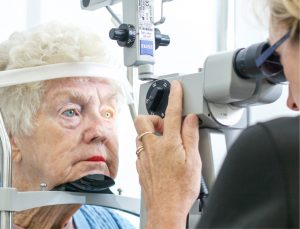Tips To Ensure You Are Not Overlooking Your Eye Health
 It is a sad fact that nearly half a million Australians have impaired vision. The prevalence of vision loss increases with every decade of life after 40 years of age. Three quarters of visual impairment can be prevented or treated with early detection. An eye test can detect the early signs of disease long before you notice any effect on your vision. The importance of regular eye examinations by your Optometrist or Ophthalmologist – if being treated for a particular eye condition, cannot be understated. A good habit to get into is having an eye examination every 2 years, unless you have an eye condition that dictates more regular check-ups. Your eye health is paramount as diminished vision can mean diminished independence.
It is a sad fact that nearly half a million Australians have impaired vision. The prevalence of vision loss increases with every decade of life after 40 years of age. Three quarters of visual impairment can be prevented or treated with early detection. An eye test can detect the early signs of disease long before you notice any effect on your vision. The importance of regular eye examinations by your Optometrist or Ophthalmologist – if being treated for a particular eye condition, cannot be understated. A good habit to get into is having an eye examination every 2 years, unless you have an eye condition that dictates more regular check-ups. Your eye health is paramount as diminished vision can mean diminished independence.
There is also a lot you can do to take better care of your eyes. The following information on recommended eye care strategies has been sourced from Vision 2020 Australia.
Protect your eyes
- When spending time out in the sun you should always wear sunglasses and a hat to prevent ultraviolet damage.
- Should you intend to undertake “Do-It-Yourself” activities around the home, protect your eyes by wearing eye protection goggles or glasses.
- If you play sport, especially sports like squash, protect your eyes by wearing appropriate protective sports glasses.
- Stop smoking! Smoking triples your chances of developing Macular Degeneration and can contribute to the development of cataracts.
- Avoid excessive alcohol consumption (which increases the chances of injury due to trips and falls).
- Eat a healthy diet with a good mix of fruit and vegetables included, and undertake regular, gentle exercise. A balanced diet that is low in fats and high in fruit and vegetables can help prevent a range of eye conditions. Dark green vegetables (spinach, broccoli), yellow/orange vegetables, fruit, nuts, seeds, whole grains, oily fish and eggs all contribute to healthy eyesight.
- Drink plenty of water to keep your whole body including your eyes hydrated.
- If you do a lot of computer based office work, take regular breaks from looking at the screen, look away from the screen and try to blink regularly, and make sure you are not straining your eyes by having the screen too bright.
- Ensure you are not going to become one of those sad statistics, arrange an eye examination without delay if you notice any of the following:
– a change in vision is noticed – blurring of vision, dark spots, headaches & dizziness etc.
– you have a family history of eye disease.
– if you have diabetes or a family history of diabetes.
– are over the age of 40 years.
– of Aboriginal or Torres Strait Islander descent.
Remember: If you have any concerns with regards to your eyes, no matter how minor, please consult a medical or eye care professional immediately.
If you are interested in learning more about proactively managing your eye health, don’t hesitate to call 1800 469 3937. Our friendly team are ready to assist with your inquiries.
For further information on Eye Health, check out Vision 2020‘s website.
 the same way that medical practitioners care for their patient’s overall, general health. Your optometrist’s skill is based on an in depth knowledge of eyes and how they work. Optometrists use a variety of multifaceted techniques and instruments to assist them to understand their patient’s eye care needs. To ensure your eyes remain in the best condition they can be you should have regular, routine eye examinations with your Optometrist, as they are an important way of detecting eye problems before you have symptoms.
the same way that medical practitioners care for their patient’s overall, general health. Your optometrist’s skill is based on an in depth knowledge of eyes and how they work. Optometrists use a variety of multifaceted techniques and instruments to assist them to understand their patient’s eye care needs. To ensure your eyes remain in the best condition they can be you should have regular, routine eye examinations with your Optometrist, as they are an important way of detecting eye problems before you have symptoms.